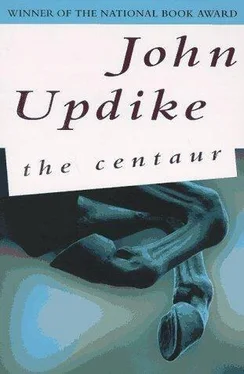John Updike - The Centaurus
Здесь есть возможность читать онлайн «John Updike - The Centaurus» весь текст электронной книги совершенно бесплатно (целиком полную версию без сокращений). В некоторых случаях можно слушать аудио, скачать через торрент в формате fb2 и присутствует краткое содержание. Жанр: Триллер, на английском языке. Описание произведения, (предисловие) а так же отзывы посетителей доступны на портале библиотеки ЛибКат.
- Название:The Centaurus
- Автор:
- Жанр:
- Год:неизвестен
- ISBN:нет данных
- Рейтинг книги:3 / 5. Голосов: 1
-
Избранное:Добавить в избранное
- Отзывы:
-
Ваша оценка:
- 60
- 1
- 2
- 3
- 4
- 5
The Centaurus: краткое содержание, описание и аннотация
Предлагаем к чтению аннотацию, описание, краткое содержание или предисловие (зависит от того, что написал сам автор книги «The Centaurus»). Если вы не нашли необходимую информацию о книге — напишите в комментариях, мы постараемся отыскать её.
In a small Pennsylvania town in the late 1940s, schoolteacher George Caldwell yearns to find some meaning in his life. Alone with his teenage son for three days in a blizzard, Caldwell sees his son grow and change as he himself begins to lost touch with his life. Interwoven with the myth of Chiron, the noblest centaur, and his own relationship to Prometheus, The Centaur one of John Updike's most brilliant and unusual novels.
The Centaurus — читать онлайн бесплатно полную книгу (весь текст) целиком
Ниже представлен текст книги, разбитый по страницам. Система сохранения места последней прочитанной страницы, позволяет с удобством читать онлайн бесплатно книгу «The Centaurus», без необходимости каждый раз заново искать на чём Вы остановились. Поставьте закладку, и сможете в любой момент перейти на страницу, на которой закончили чтение.
Интервал:
Закладка:

John Updike
The Centaurus
© 1963
“Heaven is the creation inconceivable to man, earth the creation conceivable to him. He himself is the creature on the boundary between heaven and earth.”
– KARL BARTH
But it was still needful that a life should be given to expiate that ancient sin,-the theft of fire. It happened that Chiron, noblest of all the Centaurs (who are half horses and half men), was wandering the world in agony from a wound that he had received by strange mischance. For, at a certain wedding-feast among the Lapithae of Thessaly, one of the turbulent Centaurs had attempted to steal away the bride. A fierce struggle followed, and in the general confusion, Chiron, blameless as he was, had been wounded by a poisoned arrow. Ever tormented with the hurt and never to be healed, the immortal Centaur longed for death, and begged that he might be accepted as an atonement for Prometheus. The gods heard his prayer and took away his pain and his immortality. He died like any wearied man, and Zeus set him as a shining archer among the stars.
– Old Greek Folk Stones Told Anew
BY JOSEPHINE PRESTON PEABODY, 1897
I
CALDWELL turned and as he turned his ankle received an arrow. The class burst into laughter. The pain scaled the slender core of his shin, whirled in the complexities of his knee, and, swollen broader, more thunderous, mounted into his bowels. His eyes were forced upward to the blackboard, where he had chalked the number 5,000,000,000, the probable age in years of the universe. The laughter of the class, graduating from the first shrill bark of surprise into a deliberately aimed hooting, seemed to crowd against him, to crush the privacy that he so much desired, a privacy in which he could be alone with his pain, gauging its strength, estimating its duration, inspecting its anatomy. The pain extended a feeler into his head and unfolded its wet wings along the walls of his thorax, so that he felt, in his sudden scarlet blindness, to be himself a large bird waking from sleep. The blackboard, milky slate smeared with the traces of last night’s washing, clung to his consciousness like a membrane. The pain seemed to be displacing with its own hairy segments his heart and lungs; as its grip swelled in his throat he felt he was holding his brain like a morsel on a platter high out of hungry reach. Several of the boys in their bright shirts all colors of the rainbow had risen upright at their desks, leering and baying at their teacher, cocking their muddy shoes on the folding seats. The confusion became unbearable. Caldwell limped to the door and shut it behind him on the furious festal noise.
Out in the hall, the feather end of the arrow scraped on the floor with every step. The metallic scratch and stiff rustle mixed disagreeably. His stomach began to sway with nausea. The dim, long walls of the ochre hall wavered; the classroom doors, inset with square numbered panes of frosted glass, seemed experimental panels immersed in an activated liquid charged with children’s voices chanting French, singing anthems, discussing problems of Social Science. Avez-vous une maison jolie? Oui, j’ai une maison tres jolie for amber waves of grain, for purple mountain majesties above the fruited plain throughout our history boys and girls (this was the voice of Pholos), the federal government has grown in prestige, power, and authority but we must not forget, boys and girls, that by origin we are a union of sovereign republics, the United God shed his grace on thee, and crown thy good with brotherhood -the beautiful song was blindly persisting in Caldwell’s brain. To shining sea . The old baloney. He had heard it first in Passaic. Since then, how strange he had grown! His top half felt all afloat in a starry firmament of ideals and young voices singing; the rest of his self was heavily sunk in a swamp where it must, eventually, drown. Each time the feathers brushed the floor, the shaft worked in his wound. He tried to keep that leg from touching the floor, but the jagged clatter of the three remaining hooves sounded so loud he was afraid one of the doors would snap open and another teacher emerge to bar his way. In this crisis his fellow-teachers seemed herdsmen of terror, threatening to squeeze him back into the room with the students. His bowels weakly convulsed; on the glimmering varnished boards, right in front of the trophy case with its hundred silver eyes, he deposited, without breaking stride, a steaming dark spreading cone. His great gray-dappled flanks twitched with distaste, but like a figurehead on the prow of a foundering ship his head and torso pressed forward.
The faint watery blur above the side doors drew him on. Here, at the far end of the hall, through windows” exteriorly screened against vandalism, light from outdoors entered the school and, unable to spread in the viscid, varnished atmosphere, remained captured, like water in oil, above the en trance. Toward this bluish bubble of light the moth inside him drove Caldwell ’s high, handsome, compounded body. His viscera squirmed; a dusty antenna brushed the roof of his mouth. Yet also on his palate he eagerly tasted an anticipation of fresh air. The air brightened. He bucked the double doors whose dirty glass was reinforced with chicken wire. In a tumult of pain, the arrow battering the steel balusters, he threw himself down the short flight of steps to the concrete landing. In ascending these steps a child had hastily penciled FUCK on the darkly lustrous wall. Caldwell gripped the brass bar and, his mouth thin with determination beneath his pinched and frightened eyes, he pushed into the open.
His nostrils made two plumes of frost. It was January. The clear blue of the towering sky seemed forceful yet enigmatic.
The immense level swath of the school’s side lawn, pointed at the corners by plantings of pines, was, though this was winter’s heart, green; but the color was frozen, paralyzed, vestigial, artificial. Beyond the school grounds, a trolley car, gently clanging, floated up the pike toward Ely. Virtually empty- the time was eleven o’clock, the shoppers were all going the other way, into Alton -it swayed lightly on its tracks and the straw seats showered sparks of gold through the windows. Outdoors, in the face of spatial grandeur, his pain seemed abashed. Dwarfed, it retreated into his ankle, became hard and sullen and contemptible. Caldwell ’s strange silhouette took on dignity; his shoulders-a little narrow for so large a creature-straightened, and he moved, if not at a prance, yet with such pressured stoic grace that the limp was enrolled in his stride. He took the paved walk between the frozen lawn and the brimming parking lot. Beneath his belly the grimacing grilles flashed in the white winter sun; the scratches in the chrome were iridescent as diamonds. The cold began to shorten his breath. Behind him in the salmon-brick hulk of the high school a buzzer sounded, dismissing the class he had abandoned. With a sluggish digestive rumble, the classes shifted.
Hummel’s Garage adjoined the Olinger High School property, a little irregular river of asphalt separating them. Its association with the school was not merely territorial. Hummel had for many years, though not now, served on the school board, and his young red-haired wife, Vera, was the girls’ physical education instructor. The garage got much trade from the high school. Boys brought their derelict jalopies here to be fixed, and younger boys pumped up basketballs with the free air. In the front part of the building, in the large room where Hummel kept his accounts and his tattered, blackened library of spare-parts catalogues and where two wooden desks side by side each supported a nibbled foliation of papers and pads and spindles skewering up to the rusted tip fluffy stacks of pink receipts, here a cloudy glass case, its cracked top repaired with a lightning-shaped line of tire tape, kept candy in crackling wrappers waiting for children’s pennies. Here, on a brief row of greasy folding chairs overlooking a five-foot cement pit whose floor was flush with the alley outside, the male teachers sometimes-more of old than recently-sat at noon and smoked and ate Fifth Avenues and Reese’s Peanut Butter Cups and Essick’s Coughdrops and put their tightly laced and polished feet up on the railing and let their martyred nerves uncurl while, in the three-sided pit below, an automobile like an immense metal baby was washed and changed by Hummel’s swarthy men.
Читать дальшеИнтервал:
Закладка:
Похожие книги на «The Centaurus»
Представляем Вашему вниманию похожие книги на «The Centaurus» списком для выбора. Мы отобрали схожую по названию и смыслу литературу в надежде предоставить читателям больше вариантов отыскать новые, интересные, ещё непрочитанные произведения.
Обсуждение, отзывы о книге «The Centaurus» и просто собственные мнения читателей. Оставьте ваши комментарии, напишите, что Вы думаете о произведении, его смысле или главных героях. Укажите что конкретно понравилось, а что нет, и почему Вы так считаете.












